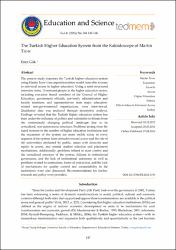The Turkish Higher Education System from the Kaleidoscope of Martin Trow
Citation
Gök, E. (2016). The Turkish Higher Education System from the Kaleidoscope of Martin Trow. Eğitim ve Bilim, 41(184), 147-168.Abstract
The present study examines the Turkish higher education system using Martin Trow’s ten-aspect transition model from elite to mass to universal access in higher education. Using a semi-structured interview form, 13 eminent people in the higher education sector, including executive board members of the Council of Higher Education, government officials, university administrators and faculty members, and representatives from major educationrelated non-governmental organizations, were interviewed. Qualitative data was analyzed through descriptive analysis. Findings revealed that the Turkish higher education system has been under the influence of politics and vulnerable to threats from the continuously changing political landscape due to its centralized, non-autonomous structure. Problems arising from the rapid increase in the number of higher education institutions and the expansion of the system are more visible today in every segment of the system, from attitudes toward access and the role of the universities attributed by public, issues with diversity and equity in access, and central student selection and placement mechanisms. Additionally, problems related to state control and the centralized structure of the system, failures in institutional governance, and the lack of institutional autonomy as well as problems related to curriculum, forms of instruction, and the lack of mechanisms for quality control and accountability in the institutions were also discussed. Recommendations for further research and policy were provided


















